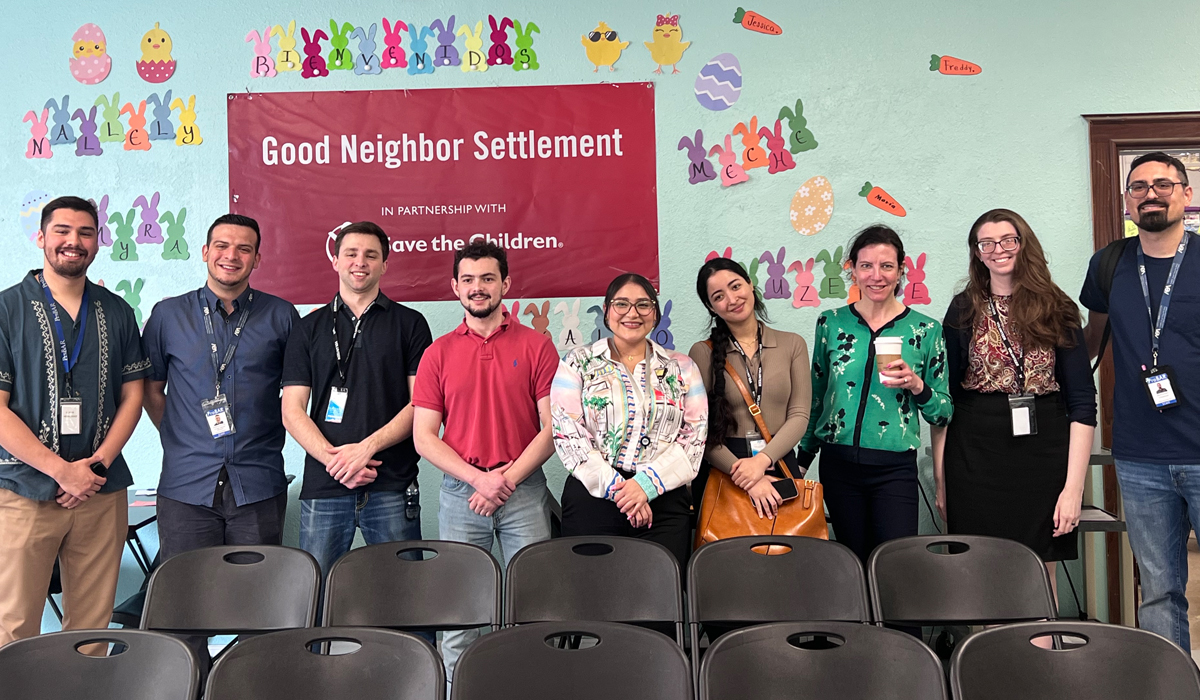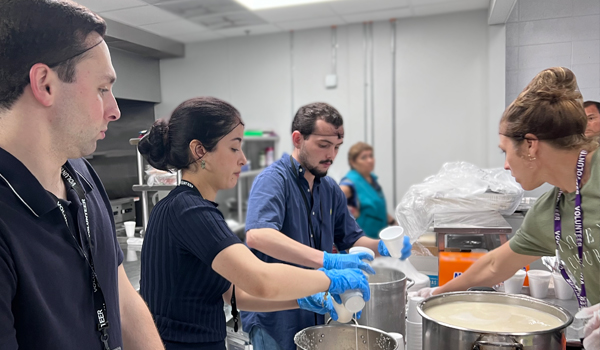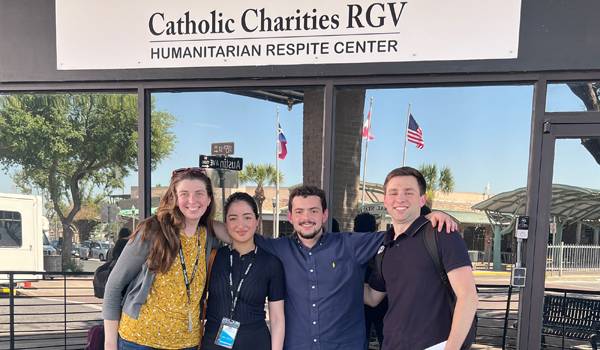 Four Catholic Law students, Amal Berrada (1L), Dylan Celentano (2L), Ian Verdaguer Homan (1L), and Andrea Quinan (1L), recently dedicated their spring break to volunteering and serving immigrants and asylum seekers on the Texas and Mexico border. Accompanied by the Director of the Immigration Refugee Advocacy Clinic, Visiting Clinical Assistant Professor Jocelyn Dyer, the group assisted with providing vital legal aid and support to indigent immigration detainees and families grappling with the complexities of the immigration process.
Four Catholic Law students, Amal Berrada (1L), Dylan Celentano (2L), Ian Verdaguer Homan (1L), and Andrea Quinan (1L), recently dedicated their spring break to volunteering and serving immigrants and asylum seekers on the Texas and Mexico border. Accompanied by the Director of the Immigration Refugee Advocacy Clinic, Visiting Clinical Assistant Professor Jocelyn Dyer, the group assisted with providing vital legal aid and support to indigent immigration detainees and families grappling with the complexities of the immigration process.
In partnership with the American Bar Association’s South Texas Pro Bono Asylum Representation Project (ProBAR), Catholic Charities of the Rio Grande Valley, and the Good Neighbor Settlement, the students participated in four projects that exposed the team to the ill treatment of immigrants at the U.S. border.
 Students volunteered with ProBAR at the El Valle Detention Center, where they encountered the somber reality of immigration detention. Although the facilities at El Valle were meant to house immigrants–many of whom fled persecution in their home countries–awaiting civil hearings, the students were struck by how similar the facilities were to traditional penitentiaries. There were barbed wire fences, and detainees wore orange jumpsuits. Moreover, the private prison company running the facility severely restricted the immigrants’ freedom of movement and their ability to connect with the outside world.
Students volunteered with ProBAR at the El Valle Detention Center, where they encountered the somber reality of immigration detention. Although the facilities at El Valle were meant to house immigrants–many of whom fled persecution in their home countries–awaiting civil hearings, the students were struck by how similar the facilities were to traditional penitentiaries. There were barbed wire fences, and detainees wore orange jumpsuits. Moreover, the private prison company running the facility severely restricted the immigrants’ freedom of movement and their ability to connect with the outside world.
At the detention center, the team observed legal orientation sessions conducted by ProBAR to help shed light on critical aspects of the asylum process. It became immediately clear that the detainees knew very little about the complex legal processes they needed to navigate without the assistance of lawyers. The students also helped ProBAR conduct legal intakes to assist some of the asylum seekers held at the facility with their cases.
During the trip, the students also observed immigration court proceedings in Harlingen, Texas. Through their observations, the students witnessed the profound influence legal representation–which is not guaranteed for immigrants–can wield in immigration court. Specifically, they saw firsthand how disparities existed between represented and unrepresented immigrants. The experience underscored the urgent need for accessible legal aid.
 To help alleviate the burden on families that had recently arrived in the U.S., the team also volunteered at a humanitarian respite center in McAllen, Texas run by Catholic Charities of the Rio Grande Valley. Within the center, the team engaged in legal orientations, provided critical information about the immigration process, served warm meals, and offered companionship to children. Although their work at the center illuminated the resilience of those fleeing horrific situations and seeking safety in the U.S., it also “somehow felt more helpless than the detention center,” because the “hurdles to immigration do not stop after successfully crossing the border or avoiding immigration detention,” as Andrea Quinan noted.
To help alleviate the burden on families that had recently arrived in the U.S., the team also volunteered at a humanitarian respite center in McAllen, Texas run by Catholic Charities of the Rio Grande Valley. Within the center, the team engaged in legal orientations, provided critical information about the immigration process, served warm meals, and offered companionship to children. Although their work at the center illuminated the resilience of those fleeing horrific situations and seeking safety in the U.S., it also “somehow felt more helpless than the detention center,” because the “hurdles to immigration do not stop after successfully crossing the border or avoiding immigration detention,” as Andrea Quinan noted.
Finally, the students journeyed to the U.S.-Mexico border in Brownville, Texas. In addition to observing the reality of crossing the border first-hand and seeing how few migrants were able to enter the U.S., the team participated in a workshop facilitating work permit applications for newly arrived migrants to help them provide for themselves and their families while awaiting legal proceedings.
These experiences had a profound effect on the students. The trip reaffirmed their dedication to advocacy and service, while opening their eyes to the lack of information many immigrants have when coming to the U.S. The group felt a deepened zeal for their future legal careers, recognizing the privilege and responsibility inherent in a legal education. For some, the trip prompted a reevaluation of their career aspirations by igniting an interest in immigration law.
Reflecting on their journey, the students emphasized the invaluable lessons learned beyond the confines of the classroom. They acquired practical legal experience, honed their advocacy skills, and deepened their comprehension of social justice issues.
As Ian Verdaguer Homan observed, “It is crucial to immerse yourself in a setting centered around authentic advocacy.” Quinan reflected that the trip was “really fulfilling and soul-lifting because it was the first time I had gotten to use my legal training in a concrete way to help someone, which was the entire reason I came to law school in the first place.”
